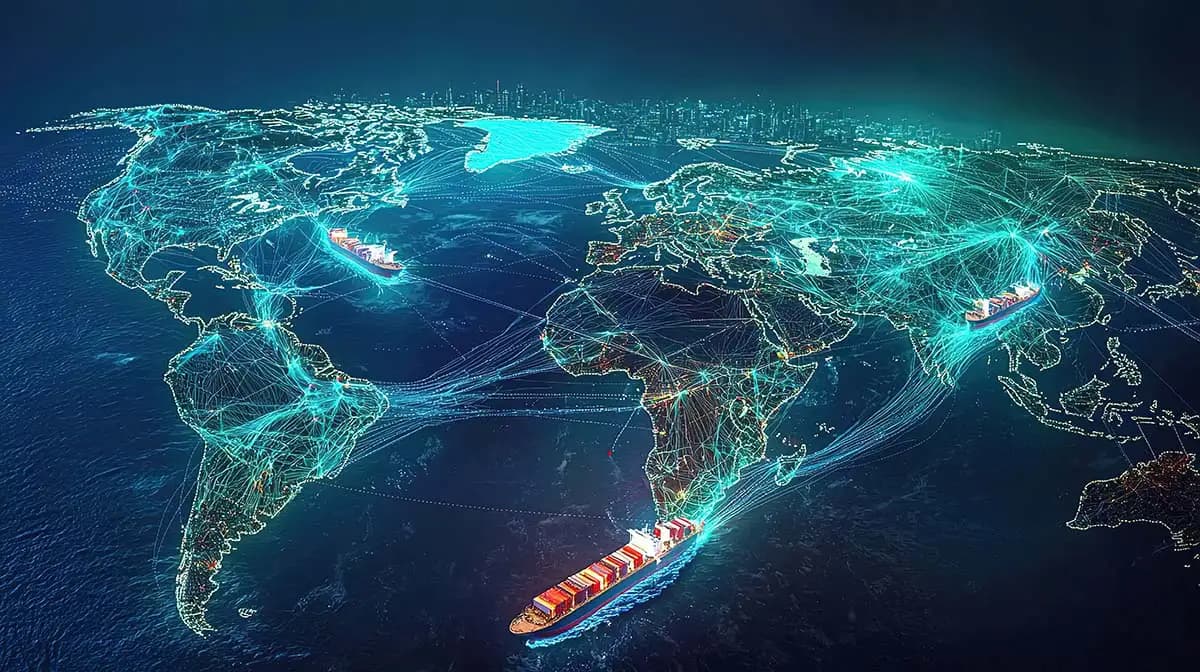Securing the Maritime Supply Chain
Ports and Shipping Companies Face Growing Data Security Threats
0 minutos de leitura

Data security is a central and growing concern for ports and shipping companies, which comprise a frequently ignored but vital part of the infrastructure underlying global commerce. As cyber threats become more sophisticated, the maritime industry has a growing need for data security to protect sensitive information and ensure the smooth operation of global trade. This blog post details what kinds of companies participate in the Maritime Transportation System (MTS) and explores recent developments in maritime data security, highlighting key trends, regulations and solutions that are shaping the industry's approach.
Who makes up the Maritime Transportation System?
The Maritime Transportation System (MTS) is composed of various types of companies, each playing a crucial role in global trade. These key business categories include:
- Shipping Lines: Companies that operate fleets of vessels to transport goods across the seas
- Logistics Providers: Firms that manage the movement and storage of goods, ensuring efficient supply chain operations
- Freight Forwarders: Entities that organize shipments for individuals or companies, coordinating the logistics of transporting goods
- Terminal Operators: Companies that manage port facilities where cargo is loaded, unloaded, and stored
- Port Authorities: Organizations responsible for overseeing the operations and security of ports
- Customs Brokers: Professionals who assist in clearing goods through customs, ensuring compliance with regulations
- Marine Insurers: Companies that provide insurance coverage for vessels and cargo, mitigating financial risks associated with maritime transport
Major trends in maritime supply chain cybersecurity
The maritime industry has faced an increasing number of cyber threats in recent years, prompting significant changes in how ports and shipping companies approach data security. The U.S. Coast Guard's annual reports have consistently highlighted growing cybersecurity challenges, emphasizing the need for resilience and proactive measures. These reports reveal a shift in focus from traditional safety concerns to the critical importance of data security, reflecting the industry's recognition of the evolving threat landscape.
The rise of AI and machine learning has not only provided new tools for defense but has also enabled cybercriminals to develop more sophisticated attack methods. These technologies allow attackers to automate and scale their efforts, making it easier to identify vulnerabilities and execute targeted attacks. For instance, ransomware attacks have become more prevalent, with cybercriminals using AI to bypass traditional security measures and encrypt critical systems. The infamous NotPetya ransomware attack on Maersk in 2017, which resulted in significant financial losses, serves as a stark reminder of the potential impact of such threats. Additionally, phishing schemes and malware have evolved, leveraging AI to create more convincing and personalized attacks.
The increasing reliance on interconnected systems and digital technologies has also expanded the attack surface for cyber threats. Port operations, including Terminal Operations Systems (TOS), are particularly vulnerable, as they manage crucial subsystems like cranes, cargo storage and processing. A successful breach can bring port activities to a standstill, causing a ripple effect throughout the global supply chain. Insider threats remain a persistent challenge, with employees potentially exploiting their access to sensitive information. Outdated systems and insufficient cybersecurity policies can exacerbate these vulnerabilities, leaving many maritime organizations underprepared to face modern cyber threats.
Regulatory responses to cyber threats in the maritime supply chain
In response to these challenges, regulatory bodies have stepped up their efforts to enforce cybersecurity standards. The U.S. Coast Guard's final rule on maritime cybersecurity, effective from July 2025, marks a pivotal moment for the industry. This rule mandates the development of comprehensive cybersecurity plans and the appointment of dedicated cybersecurity officers, ensuring that organizations within the MTS are better prepared to detect, respond to and recover from cyber incidents. Such regulations are designed to establish a baseline for cyber resilience, helping to safeguard critical infrastructure against potential attacks.
Another significant trend has been the focus on integrating cybersecurity into the procurement process. The Cybersecurity and Infrastructure Security Agency (CISA) has provided valuable guidance on how operational technology owners should prioritize security when selecting digital products. This "Secure by Demand" approach encourages maritime companies to choose manufacturers committed to continuous improvement and secure design principles.
Forcepoint solutions prevent loss of business-critical data
To address growing cybersecurity threats, Forcepoint offers robust solutions designed to improve data security posture and prevent data loss. Forcepoint Data Security Cloud provides comprehensive protection for sensitive data across cloud, web, endpoint, email and network environments. By leveraging advanced technologies including AI Mesh for data classification and dynamic policy management, Forcepoint can safeguard sensitive data against exfiltration and breaches. Features such as continuous monitoring, real-time mitigation and automated workflows enable organizations to maintain compliance and enhance their overall security posture.
As cyber threats continue to evolve, ports and shipping companies must prioritize data security to protect their operations and ensure the integrity of global commerce. By adopting the right data security solutions, companies in the MTS can take proactive steps to enhance their security posture and build resilience against potential attacks. Forcepoint's advanced data security solutions offer a reliable way to safeguard sensitive information and prevent data breaches, helping organizations navigate the complex threat landscape with confidence. Talk to an expert to discuss which solution(s) would best match your company’s needs.

Tim Herr
Leia mais artigos de Tim HerrTim serves as Brand Marketing Copywriter, executing the company's content strategy across a variety of formats and helping to communicate the benefits of Forcepoint solutions in clear, accessible language.
 The Practical Guide to Mastering Data ComplianceLer o Livro Eletrônico
The Practical Guide to Mastering Data ComplianceLer o Livro Eletrônico
X-Labs
Receba insights, análises e notícias em sua caixa de entrada

Ao Ponto
Cibersegurança
Um podcast que cobre as últimas tendências e tópicos no mundo da cibersegurança
Ouça Agora